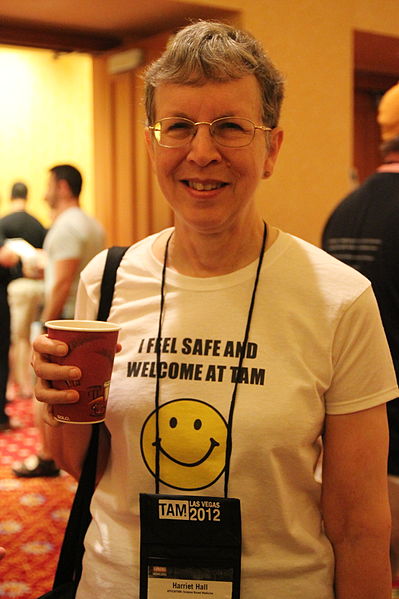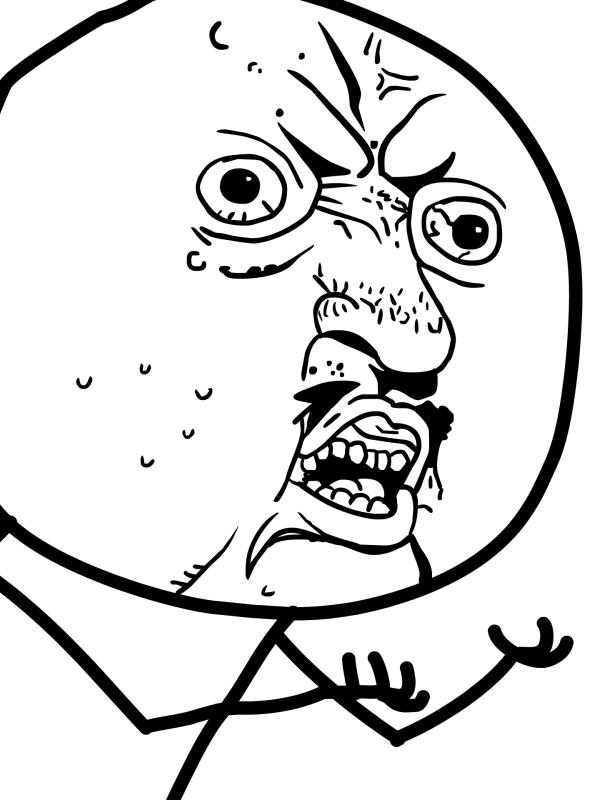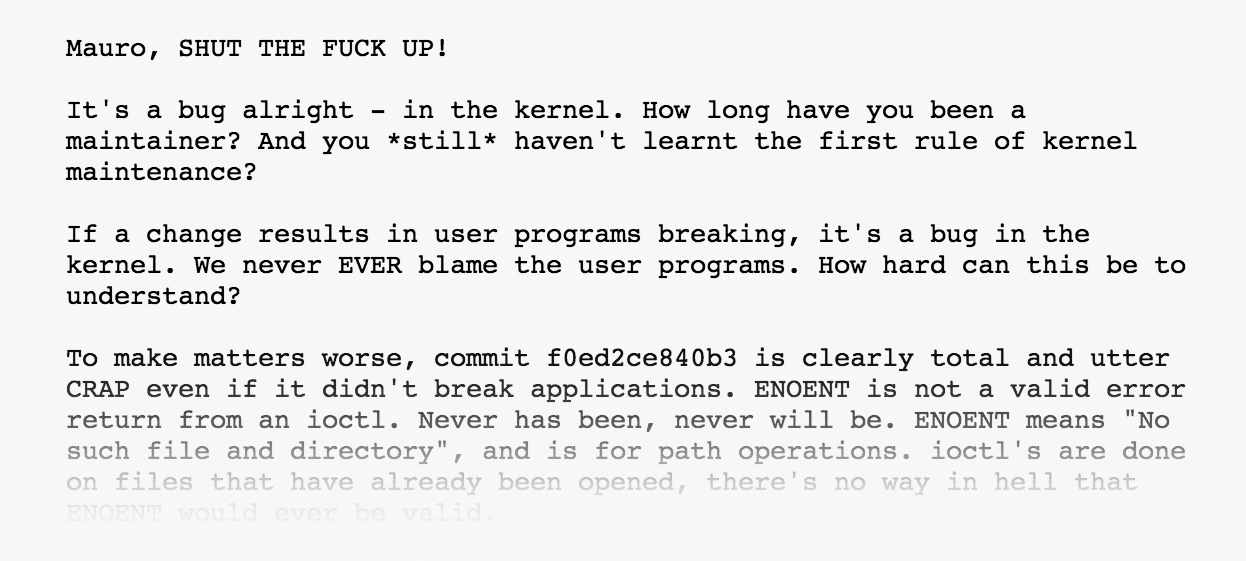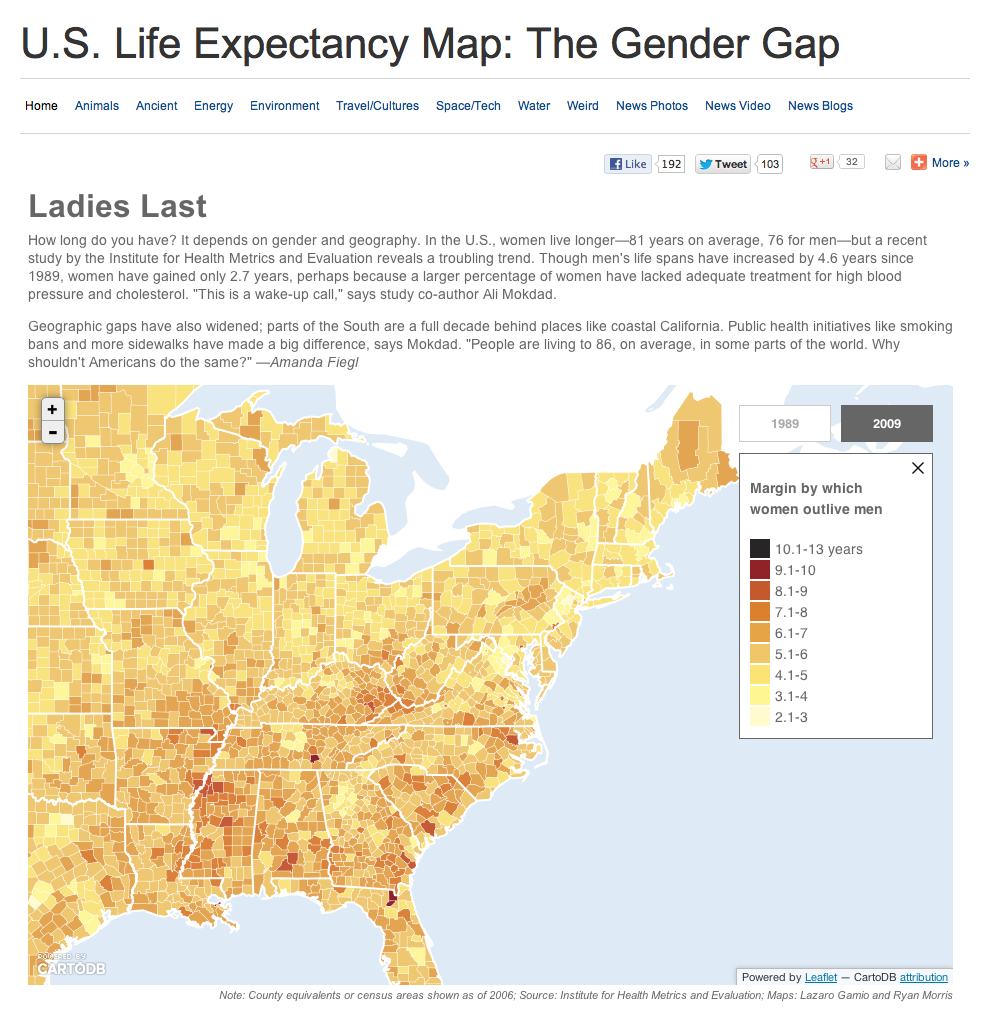
Storms and Teacups
If you've been paying attention, you'll have seen a lot more discussions about gender, feminism and harrassment lately. The conversation mostly revolves around the latest incident of the day. I'd like to reflect on the bigger picture instead, and talk about some uncomfortable truths.
This is about how we act, online and offline, and why we do it.
Please read it top to bottom, or not at all.
Special thanks go to the folks who took time to provide feedback on drafts.
The examples used in this article, whether positive or negative, are chosen for their representative nature. They are not unique exceptions that deserve special sympathy, scrutiny or scorn.
Table of Contents
- The Shametweet
- Objectification
- The Social Justice Warriors
- Women in Open Source
- The Anti-Harassment Policy
- Beating Which Odds?
- Breaking Out of The Filter Bubble
The Shametweet
Atlassian, provider of software development infrastructure, sends out a tweet to advertise one of their services:
If you're ready for a build server so pretty you could take it to the prom, you're ready for @Atlassian Bamboo.
The response is immediate and harsh:
Sexist ads won't win you fans! Grow up and don't use gendered terms to promote your tech products
A reply is made:
Sorry you don't like the wording!
We weren't being gender specific though. Men are pretty too!
Finally, cue the condescending follow ups:
For fuck's sake, way to exhibit absolutely no understanding whatsoever of the subtleties of patriarchy. Get educated.
Look closely and you'll see this pattern pop up more and more, in various forms. The key word is always educate, or more accurately, re-educate. The tone varies from feigned concern to outright hostility. If only you weren't so ignorant, you wouldn't have made such horribly offensive statements. Apologies are dismissed as insincere, a refusal to admit one's true sins.
But let's step back for a bit and look at what was said. First, Atlassian's reply is right, they weren't being gender specific, they merely compare a piece of software to prom. That's not what the indignant reader saw. They read between the lines, and substitute it with something like this:
- Women are expected by society to always be pretty. We think this is great.
- Prom is a celebration of this institutional sexism. Let's trivialize it by comparing it to server technology.
- We think you'll enjoy our use of sexism and buy our products.
For sure, everyone has their own interpretation and (I hope) I'm exaggerating. But the tweet's supposed sexism is not actually there. The speaker's intent is completely ignored, the hurt feelings of the offended take priority. The reinterpretation itself is sexist: only women can be pretty.

The worst form of this behavior is what I call the Shametweet. This is when someone retweets a statement—usually a perceived insult directed at themselves—without any further comment. The tweeter seemingly considers it beneath themselves to address the insolence directly. Instead, they choose to demonstrate their superior sensibilities to their followers. Those will then jump to his or her's defense, making the problem go away with a single click of a button, while they maintain an aura of innocent plausible deniability.
To my lack of surprise, it's mostly women who I see doing this, voluntarily turning themselves into objects, letting others claim their agency, and usually men who are all too eager to jump to the rescue, even when it's not requested. Some celebrities do it too, sicking a million followers on a target who failed to stroke their ego that morning. More than a few of these fragile celebs are men.
Objectification
Anita Sarkeesian dislikes sexist tropes and objectification of women in video games and wants to bring this problem to light. As one might expect with anyone who does anything on the internet, trolls show up, and insults and accusations of sexism start flying around. Things get ugly, and valid criticism is lost in a sea of crud. Anita cleverly uses the Streisand effect to her advantage, gets publicity in both feminist and general media, ending in a successful $158K Kickstarter campaign to produce a web video series.
Jezebel, billing itself as "Celebrity, Sex, Fashion for Women", is one of the sites eagerly siding with Anita. It appeals to their readership: a young audience of mostly women who enjoy seeing another woman doing her own thing, more so when it irritates men and advances the status of the sisterhood—if the comments are anything to go by.
Fast forward. Jezebel asks "Why Is Michelle Williams in Redface?", "You should know better".
Her transgression was to appear on a fashion magazine cover "dressed in a braided wig, dull beads, and turkey feathers [...] in a flannel shirt, jeans, and [...] some sort of academic or legal robe. [...] An attempt to portray reservation nobility [...] like she's the member of another race."
But they don't stop there. This tasteless display is in fact "akin to putting a picture of a Gentile in a stereotypical Jewish getup on the cover of Adolf Hitler's Mein Kampf". Godwin triumphs once again.
The writer may indeed have a point in there somewhere, that is, about stereotypes of First Nations cultures. But the irony is so thick you can spread it like Nutella.
Jezebel eagerly celebrates the advances of women over male-dominated society at every turn, decries Patriarchy and rings the alarm bell whenever supposed standards of equality and self-determination are violated. Now they complain that an industry they focus on, which treats people like objects to be dressed and painted, didn't objectify a woman in a tasteful enough fashion.
They should do an exposé on the Emperor's wardrobe next.
Who is it really, that is pressuring women to be passive, immaculate and above all, politically correct dolls? Is it really all men's fault? Or is it fueled by media and advertising that bills itself "For Women" in giant pink letters, but really seems to be just about "Judging Women" instead, telling them they need to look better, be likeable supermoms as well as executives, but deserve to have it all, honest?
On the other side, gaming sister-site Kotaku asks "She's Sexy. Now kill her?", questioning the "humiliation of sexualized females" in God of War: Ascension. In this game's bloody quest of revenge, after a couple hours of brutally murdering several armies of mythological creatures one by one, you stab the Medusa-like Gorgon in the chest. On top of its giant snake body, right where its breasts are. Gasp.
This scene summarizes "all [the] issues with violence against sexualized female characters in one nutshell." But after describing it in the context of the game, only one real objection remains: "Breasts code some enemies as female, [...] violence against [these] body parts is disturbing," and is not the usual "norm in games".
The game is presenting "a form of feminine beauty that associates exposed, large breasts as beautiful." The author seems to be confusing "sexualized" and "sexy", as if sexualization is only what turns him on—I think it's breasts—and something must be sexualized before it can be arousing. Apparently if the Gorgon had been obese and flat-chested, there'd be no issue in putting it down. Which is exactly what Euryale looked like, the repulsive Gorgon the author must've killed in the previous game.
This attempted pro-woman analysis of sexualized portrayal seems to suggest that a feminized body is automatically sexual, but only if she's hot enough, like say, the "final, sexy boss."
The Social Justice Warriors
Skeptic blogger and retired medical doctor Harriet Hall writes a post, titled I Am Not Your Enemy: An Open Letter to My Feminist Critics. She clarifies exactly what she said and meant on a previous occasion. The comments then continue to argue back and forth about what it all means.
It goes back to a t-shirt she wore at a conference, stating she "felt safe and welcome" and was "just a skeptic, not a 'skepchick', not a 'woman skeptic', just a skeptic". This shirt was apparently so offensive and dehumanizing it reduced one of its victims to tears.
All of this is fallout from the scandal known as ElevatorGate. A man at a conference asked Rebecca Watson up for coffee in an elevator, after a late night in the hotel bar, and accepted no for an answer. Cue the public shaming based on her one-sided account, using her position as a conference speaker, and the inevitable backlash. The man himself however has wisely chosen to stay out of it and remains unidentified. It prompted Richard Dawkins to point to more serious women's issues to possibly worry about, who was then chastized for speaking from white male privilege. This scandal, entirely based on hearsay, is still going on a year later.
In fact, Harriet's thread features an appearance from Rebecca herself. She takes "ten precious minutes" out of her busy schedule to explain she "doesn't really think of [her] at all", after clarifying why she feels the post talks about her directly. Despite admitting to writing and deleting both a blog post and a private email on the subject, Rebecca says Harriet "doesn’t actually deserve an explanation, [or] real estate in my head" which is why she "let others argue over it". Which she says right after arguing over it.
Does this sound at all familiar? She includes that she would be "concerned for [her] personal hygiene" for wearing one shirt several days in a row. I'm not making this up.
Like Dawkins, I wonder: Don't these people have more important things to get angry at? Are they just self-absorbed, seeking publicity through controversy? Some undoubtedly are, but for the majority I think it's far more simple.
It's fair to ask: why are they so bothered and offended, spending their free leisure time organizing miniature online protests, thread after thread? Was the t-shirt (or the tweet) a direct, personal insult? Did it insult a class of people they belong to? Is it specific enough that someone could reasonably argue it applies to them, but not the next person? No.
So why take it personally? It's because it reminds us of an uncomfortable truth about ourselves or the world. In Atlassian's case, it's that beauty has a dark side, and it gives some people an unfair advantage or disadvantage. Did I get this job because of my talents or my looks? Do I present myself badly? Do people judge me by things beyond my control? Do I have a weird face? It reminds us of all the times we've experienced this ourselves, and if you have children, of all the times they will too. The internet becomes a mirror for our own insecurities, and we read our worries into everything.
In Harriet Hall's case, it's the acknowledgement that life is what we make of it, that people disagree with us more than we like to admit, and that often the best thing to do is shrug and not let it bother you, and focus on results rather than labels. Though again, everyone's interpretation is different.
But we don't want to admit that, our pride does not allow it. We'd much rather explain our unease by assuming it was inflicted deliberately, and we make up convenient reasons why that is so, why we were targeted. See, Atlassian is just another sexist tech company, they can't even tweet without insulting every woman on the planet! Harriet Hall, born in 1945, the second ever female intern in the US Air Force, must be an ignorant ditz when it comes to matters of feminism, because of one smelly t-shirt. If you don't see it the same way, well, you're just not educated enough to read between the lines.
It's both men and women who do it. We can argue who is more at fault until the cows come home, but when it comes to sexism it's fair to say men take the brunt of the blame, and are the ones expected to make amends. It's completely one sided, and it's another one of those convenient excuses that we substitute for the real thing. We don't want to talk about the full complexity at play here. Indeed, the closest feminism gets to acknowledging this is, Patriarchy hurts men too! So it's not my fault, just the result of every single choice I've ever made?
When someone points out that viewing everything through a uniquely feminist and female-oriented lens gives a skewed perspective, a rapid fire meme is returned: "But what about the mennzzz?" Attempting to show that inequality applies to both genders, quite often in women's favor, is considered derailing. Showing that the feminist interpretation of history as unbridled Patriarchy is unrealistic, and that feminism has long ago developed its own oppressive and hateful character, is dismissed as misogyny, even when it's women saying it.
There's more handy tropes to end attempts at nuance and shut down discussion: Check Your Privilege, Stop JAQing off (Just Asking Questions), Mansplaining, Victim Blaming, Nice Guy, Schrödinger's Rapist. The list goes on, and all of a sudden, concerns about gendered slurs no longer apply.
The so-called "safe space" that these online social justice groups claim to seek, is just another word for a censored space, and a hypocritical one at that. It's one where certain ideas and thoughts are not to be uttered, and must be replaced by less realistic and less worrisome ones. But no true safe space exists, as offense is always in the eye of the beholder.
Listening involves an interpretation of what people thought it meant they heard.
Women in Open Source
Statistics show that women observe sexism online to a higher degree than men, particularly in tech and open source. Recommendations are made on how to make the community more friendly to women, and most suggestions involve re-educating men to reduce their blindness. More so, it's implied that once the atmosphere is respectful enough, women will join and equality will be achieved.

Sorry, but I don't buy it, because as late as 2006, 28% of participants in proprietary software were women, but only 1.5% in open source. Most open source projects start out as hobbies, created by one person in their spare time. If the community was such a sexist hell for women, wouldn't you expect the web to be littered with the abandoned works of that 1/4th of professionals who are women, who were turned off by how it was received once published? Instead, I find that female-founded projects are far and few, and calls for women to participate consist mainly of inviting them into existing projects, and speaking at established conferences about existing technologies.
Is the increasing role of women in open source a consequence of empowerment and self-direction? Or does it stem from the fact that open source is becoming more important in commercial use, and now more women are tagging along? It's both, naturally, but the huge gap between the two gender ratios can't be reduced to abuse and sexism. For a multitude of reasons, women simply aren't as interested as a group.
A big part of the problem is confidence, and starts much earlier: you must be this smart to be in open source, or so people think. Angela Byron, winner of the 2008 Google-O'Reilly Best Contributor award, called to "Fight the Einstein Perception" in Women in Open Source. It took Google's Summer of Code to convince her to take the plunge and make the career change. Programs like that are great to bring fresh talent into a community, but they won't cause the seismic shift in gender balance that feminism requires. If we want more women in open source, shouldn't we encourage them to just do their own thing, as those 98.5% of contributors who were male seemed to be doing?
Open source is claimed to be a meritocracy, but it really isn't. Once two people start modifying the same code, politics get involved, and I can certainly speak from experience that decisions at the top of an open source project are more about people and their interests than code. It isn't enough to create a good solution, it must be advocated and accepted, and apply to a wide variety of existing scenarios. If the work isn't good enough and fails, reputations take a hit. Like this:
Linus Torvalds can act like a complete asshole, self-admittedly so, chew out his (male) contributors, and nobody in particular seems to mind. Linux is successful either despite or because of it.
Linus builds and directs software millions rely on. His abrasive tone reflects the importance of the issues he deals with on a daily basis. So far, his peers have deemed it socially acceptable. You may hate this, but you can't ignore it.
Can we really say with a straight face that he could talk the exact same way to a female contributor, and nothing would be different? In a culture where "never hit a woman" is considered a valid rule by many, men are the default assumed aggressor in domestic violence, and expected to chase the burglar—another man no doubt—out of the house to protect their wife and children? Or would it spawn thread after thread of discussions of just how bad the transgression was, and how to make sure it never happens again?
Open source culture is quite competitive, but the biggest problem an open source contributor has isn't criticism, it's getting people to pay attention in the first place. Ironically, this is something women are innately privileged in: studies show women have automatic in-group bias—women like women more than men like men—that people prefer their mothers to their fathers, and men are universally associated with negative behavior such as violence. It's propagated in the popular stereotypes of the bumbling husband, the insensitive jock, the aggressive bully, and so on.
That perspective is dismissed by feminists as lashing out from male privilege, and the fear of losing it. But how privileged are men over women, when their life expectancy recedes further from that of women the lower the standard of living? Is there a Kickstarter I can donate to for that? No, instead National Geographic states matter of factly that it's a "troubling trend" and a "wake up call" that men's life expectancy is getting closer to that of women in the US, because it means women are gaining less. They use the margin by which women outlive men as if it's some sort of index of prosperity.
Hey, remember that time when Hillary Clinton said "Women have always been the primary victims of war"? Because they "lose their husbands, their fathers, their sons in combat." A woman who survives is more of a victim than a man who dies for her, please be sure to educate yourself on this.
Could it be that the sexism women say they are constantly subjected to online, is merely the flipside of a coin? One that allows them to cultivate attention with nothing more than a well-chosen avatar, and which men eagerly give to them? How many women forego the make-up in their profiles and videos before lamenting the unsolicited date proposals, awkward as they may be?
I'm not ignoring cases like Kathy Sierra and the persistent, real harassment she received, but let's not forget that it was inflicted by individuals upon individuals, not on womankind.
When the overwhelming majority of open source contributors are men fighting for recognition, do you suppose some of them might feel some resentment that a woman can walk into a room, real or virtual, and make everyone's head turn? If so, do women's concerns deserve automatic precedence over men's? The country I live in has a Minister for the Status of Women after all. Not for Equality.
The Anti-Harrassment Policy
To attend or speak at JSConf, you must agree to a code of conduct. Its goal is to create a positive, harassment free environment, something which I am all for. The policy is starting to be adopted verbatim by other conferences, like PyCon.
But the wording explicitly defines harrassment as including "offensive verbal comments", specifically "related to gender, sexual orientation, disability, physical appearance, body size, race, religion, sexual images in public spaces, deliberate intimidation, stalking, following, harassing photography or recording, sustained disruption of talks or other events, inappropriate physical contact, and unwelcome sexual attention."
How many of the storms in teacups above would fall under this wide umbrella? If the yardstick to be applied is offense, then this basically forces everyone to walk on egg shells and admit guilt ahead of time. "Participants asked to stop any harassing behavior are expected to comply immediately." There is no room here to discuss the merit of a particular case, to measure the validity of a claim.
Indeed, the latest is that we cancel the talk first, ask questions later, based on the concerns of a single complaint over a title without a summary. The threat of going public was possibly made, but accounts differ. I find the Ada Initiative's first response to the situation revealing.
While stressing the real issue is staying on topic and not devolving into unnecessary sexual talk, every negative point raised appears to concern only women. "Sexual topics [...] can be perceived as encouragement to humiliate, objectify, and assault women, regardless of the intent of the speaker." And, "Many people are unable to separate 'talking about sex' and 'saying derogatory things about women'." Their response shows they assumed the talk would not be "done in a woman-positive way". That is, a talk featuring a female speaker who blogs about harm reduction.
At no point do they express regret at having silenced a voice. "Be considerate and thoughtful," it ends.
Let me borrow a quote from Stephen Fry: "The only people who are obsessed with food are anorexics and the morbidly obese, and that in erotic terms is the Catholic church in a nutshell." You'll never see more talk of sexism and rape than on feminist websites.
Trigger warnings, humiliation, objectification, assault, rape culture: feminism's opinion of neither men nor women's abilities to act mature around each other seems particularly high.
As an aside, have you ever noticed how Tumblr isn't just a hub for bold feminism, but also erotic fanfics? And by 'erotic' I mean gay sex of dubious consent set in the Twilight universe. You know. Rape. That fangirls write and fantasize about. And joke about in hushed tones at Comic-Con. Is that woman-positive enough, or are the lines blurring a bit?
More recently, someone lost their job after public shaming involving an overheard and misinterpreted comment about "forking" and "dongles", and the guy still felt the need to apologize profusely to the female offendee. Her media presence exceeds his by far and includes tweeting about "[putting] something into your pants [...] like a bunch of socks". Meanwhile followers thanked her for her bravery, that is, snapping a picture with a smile and throwing it to the lions. Who was abusing who here?
Of course it blew up into its own internet storm, but can you blame people for responding in kind to an example that's been so clearly set?
People read Woman fired for getting upset at man's joke and fill in the rest of the story themselves, like this animated GIF equivalent of a temper tantrum. More dignified publications instead carefully explain "Why asking what [she] could have done differently is the wrong question", that is, the one question in this entire fiasco the rest of us could actually learn something from.
Judging a book by its cover is the new tolerance. We throw people into the stocks based on feelings while ignoring intent and assuming victimhood. This is why I fundamentally disagree with equating offense with harassment: it provides unlimited ammo and shuts down discussion rather than giving people the benefit of doubt. It elevates the exception to the norm, by presuming the worst.
Here's a clause I'd like to see instead: if you choose to air minor incidents in public one-sidely—or threaten to do so—rather than resolving the matter in private, you lose by default. Leave the soapbox for the people who actually need it. Also, if a speaker has been invited and has spent time preparing a talk, it's the most basic courtesy to honor that invitation, no matter what. Let people judge it on its own merits. We attend conferences to hear other points of view, not to be sheltered from them.
As for the creeper move cards, please toss them out, because that's not how adults resolve differences. How gender-neutral is the word creep anyway, and how would you respond to being dismissed with a generic scrap of paper printed from the internet?
If you reduce communication to such a passive aggressive and childish statement, color me unsurprised when you receive an equally childish response, especially in a community that thrives on subversion and creative re-use of things they're not supposed to toy with. It's the exact same attitude that protects us from DRM, eagerly tests claims of privacy and security, and liberates closed technology for those without access. You cannot have one without the other.
Conferences are social gatherings, and sexuality is a normal part of that. I know several happy couples who met at a tech conference, coming from different cities or even countries. Are we to assume that none of them used this opportunity to hook up, and that relationships never happen without ambiguity and misunderstanding? It's not a binary choice between tweeting #ITappedThat and turning conferences into convents.
But why does it seem like there are so many socially maladjusted men roaming these conferences? Does anyone care about the reasons at all, like say, the high rate of autism-spectrum disorders among geeks? Could it be due to the emphasis schools and universities place on non-intellectual pursuits like sports and popularity, and the bullying that results from it? Because it seems to me what some socially awkward hackers have done is exactly what the social justice warriors want: they've created a safe space for themselves, where only their own rules apply.
I never hear much about the effect "Jock culture" has on men, but quite a lot about "Rape culture" and women. We stereotype geeky men as neckbearded basement dwellers whom women are to be protected from unilaterally, rather than working towards real resolution. I don't mind the word neckbeard personally, it can be a humorous badge of pride, but if it's offensive to anyone, surely that's men, not women?
Beating Which Odds?
In a post titled, Beating the Odds, the JSConf organizers explain how they got 25% of their speakers to be women. The choice quote is: "Our industry systematically biases against 50% of great speakers and misses out on a significant amount of talks, topics, discussion and thus progress." The argument is that, despite only 10% of proposals coming from women, an anonymized selection process disproportionately favored female speakers.
Under a more traditional selection process, these women's valuable and apparently superior contributions would have been ignored. Note how they ignore the ratio of men and women in the industry, and assume this would not affect the gender ratio of good candidates: 50% of them are assumed to be women. That's not how statistics work.
The results: "Our highest ranked talk is from a woman and we know we wouldn’t have gotten that talk without the outreach we did." And: "We invited 35 women to submit to the [Call For Proposals], of these 13 ended up submitting one or more proposals, 5 women submitted on their own."
So basically, there is a significant amount of pre-selection going on here. In their outreach to female candidates, organizers naturally prefer women who they already think will make good speakers. These candidates then further self-selected based on their own confidence and skill. Less than half of female speakers submitted on their own. Meanwhile, the 162 proposals from men came from the usual pool, requiring no unique outreach. Despite extolling the virtues of anonymized selection, the process was biased to favor talented women from the get go, and it's no surprise women sent in better proposals as a group.
Given the rates of commercial and open source tech participation for women, getting 25% female speakers is a high number, assuming fair random sampling, beating the odds. But it's not random at all. The cure for sexism is apparently... more special treatment for women?
It also bothers me on a personal level: I'm gay, and feel equally excluded when someone puts a picture of Natalie Portman in their JavaScript talk. But even if I wasn't, who's to assume my opinions on the matter would fall in line with the cliché? When people do diversity spot checks of speaker panels and rally the horde, I get counted as just another dude propagating patriarchy and heteronormativeness. What does it tell you when the first thought upon seeing a lone woman in a line-up is token female rather than trailblazer?
Now, I'm not against setting a good example, and I realize the perception of a boy's club can be a barrier to entry. However that shouldn't distract us from what equality of opportunity actually looks like. In tech, it's nowhere near a 50 / 50 gender split, because the imbalance starts much earlier, with more men than women going into STEM fields, despite the fact that 3 women now graduate for every 2 men.
Can we at least give women the benefit of the doubt and assume that they go after what interests them, rather than being unable to choose differently? Even in the most gender-equal country in the world, Norway, STEM fields are still male dominated and the social sector remains female dominated, despite decades of fervent pro-equality policy and education.
How solid and gender-neutral is the research that traces this all back to social pressure? The 2010 documentary Hjernevask (Brainwash) provided a very revealing answer to this question and others, causing a stir in the Norwegian academic community. I highly recommend watching it, there are English subtitles. I found the resemblance to creationism and intelligent design striking: supposed scientists were dismissing observations out of hand because of perceived implications, questioning the author's motives instead. But sexual dimorphism doesn't imply patriarchy, any more than evolution implies social darwinism.
Some choice facts from honest nature vs. nurture research: even day-old babies show a measurable difference in interest between boys and girls, when presented with both a mechanical toy and a human face. Genetically identical twins have similar IQs and depression rates and research with adopted children shows a similar relation to their biological parents, much more than their adoptive ones. This is no reason to treat individuals any different, but some averages differ innately across gender lines, and I don't see that as something we can or should fix by overcompensating.
Breaking Out of The Filter Bubble
Above all, there's a common thread I can't ignore. The women I admire and respect in tech did so primarily on their own merit, letting nobody speak for them but themselves. Like the men I look up to, they point people to their accomplishments, not their likeability. Their Twitter bios don't consist of one ism after another, showing their adherence to a pre-approved set of beliefs. They don't let random trolls derail them, and they don't find themselves at the center of fires of their own making, expecting others to put them out.
It's also the ideal I aim for. When a couple thousand people on YouTube told me I had no life, I laughed my ass off at the absurdity. I'd just created an accidental experiment in viral media, and learned tons in the process. Meanwhile they just watched a video they apparently didn't like, and then wasted more of their time to point this out. They weren't talking about me, they were talking about themselves.
When people told me I killed Unix, that I should be shot, and that I was just some idiot designer who didn't understand code, I didn't have the privilege to retweet the offense and let my posse roll in. I could only ignore it, taking the reputation hit, or refute the misconceptions with arguments and insight, changing people's minds one post at a time. The arrogant Unix greybeards who bugged me in private? Simple: you bait them into telling you everything they know, pan for gold amongst the mud, and move on. One person against the might of Twitter, HackerNews and Reddit: it's really not so bad, just don't take it too seriously. Once the novelty wears off, the bystander effect kicks in, unless you keep stoking the fires yourself.
Of course, I did let it inform my choices: I stopped working on that project in public, realizing I wasn't going to get much useful participation until much later, and I could do without the distraction. But it no longer bothers me, it's just one in a long line of useful experiments. The lingering frustration I feel is about people's short sightedness, not bruised ego. Ever since then, I treat the internet like I would a lovable-but-backwards grandparent, who makes racist comments over Christmas dinner. Yes Grandma, it's all the damn commie jews and faggots' fault, now, who wants dessert?
No, I don't feel bad for dropping in those sacrilegious words in there just now. I like to think you are mature enough to let those letters pass under your eyes, without burning me at the stake because it reminds you of something unpleasant. I trust you to focus on the couple thousand words I started with, rather than just two at the end. See, the reason people say the n-word instead of nigger when talking about racism, is that they don't yet realize they too would have owned slaves back then.
When the internet gets its panties in a bunch for the umpteenth time, it's worth asking: where are people getting their information from? The plural of anecdote is not data, after all. Every incident I've heard of lately was massively blown out of proportion. Kony 2012 anyone? Look, finally a cause we can all be equally offended by.
Women are adamant about not being pigeonholed by their gender. I see no reason why we should encourage and celebrate doing it to men. Whether male or female, or any of the shades in between and around, people can have wildly different points of view, and reducing everything to a gender battle is as myopic as pretending no issues exist at all.
The most reasonable people are now afraid to speak their mind. They rightly fear being shamed and harassed by those who scream the loudest of abuse. I've debated writing about this for a while, because I know what a certain part of the response will be. But I'm not the only one saying it, so I'm doing it here, once, in full length, with honest citations, after discussion with people of experience. Women and men, in case you're wondering. "Good luck" was a common theme.
Remember, I'm not the one trying to make hay out of gender issues, turning them into ad revenue, TV appearances or book sales. In my line of work, we're expected to fix things, not just tell people they're broken in increasingly hyperbolic words.
Don't man the cannons or summon the horde. Instead, go check out the ton of links I just dropped into your lap, listen to what's already been said, and see if you can't hear the sound of a record skipping somewhere in the distance. It's not the one you think it is.
For the future then, something to think about. If I step outside, I can walk a couple blocks in any direction to encounter these.
I've taken the liberty of making them more honest:
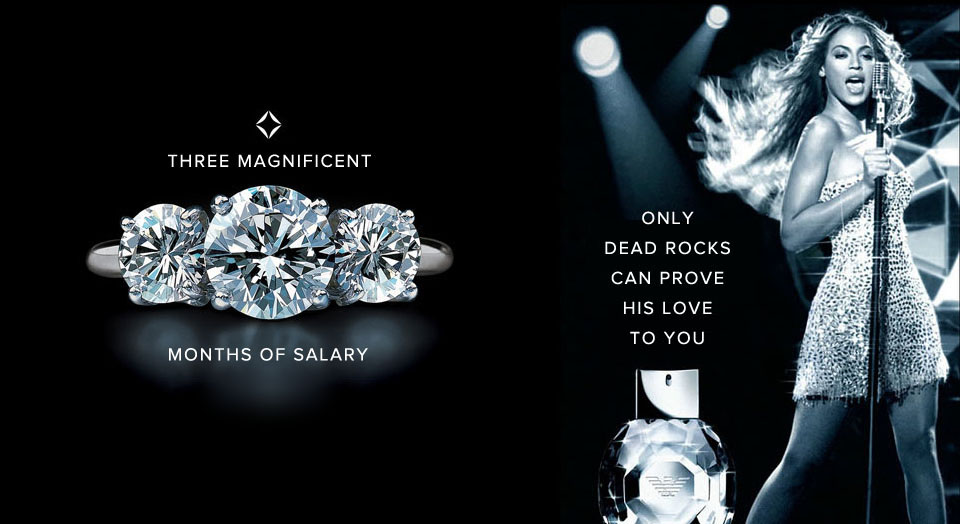

This is what we allow advertisers to paste onto our streets, our newspapers, our TV shows. Our brains. And then the media turns around to tell us how everyone's being selfish and insecure, but sexism is to blame.
As a smarter person put it, it's narcissism repackaged as a gender battle.
Don't say it doesn't affect you, not when a picture of dollar bills makes you more reluctant to help someone pick up pencils.



